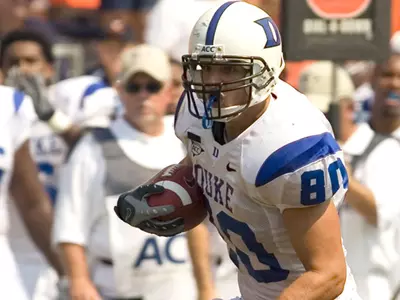Completed Event: Men's Soccer versus California on November 5, 2025 , Loss , 0, to, 2


9/28/2007 12:00:00 AM | Football, Men's Lacrosse, Men's Soccer
DURHAM, N.C. ? Other than for the annual semester break at Christmas, tight end Nick Stefanow can't remember taking any trips back to his home in West Virginia since enrolling at Duke five years ago. He's stayed on campus every summer and dedicated an inordinate amount of time to his athletic development.
“He's a very committed young man who has so much invested in this football program,” Duke coach Ted Roof says.
Stefanow does not feel unique in that regard, noting that most of the team shares his level of commitment. But Stefanow does own one distinction on the 2007 Blue Devil roster ? he's the only player who has already earned his Duke degree and is now enrolled in graduate school.
Football players with eyes on the five-year plan typically spread out their course credits so they will graduate in December after their fifth football season. But Stefanow had so many credits built up through his summer school attendance that it was not practical for him to defer graduation last May. He is using his fifth year to pursue a master's degree in the humanities. He started the 30-hour program this past summer and expects to finish in the spring.
“It's a self-designed master's program where you take courses from the humanities around a theme,” he said, “My theme is global perspectives on business, so I'm taking classes that focus on cultures and economic systems of different countries and world cultures, eventually to hope to do business with them.”
Since he arrived as a relatively undersized (215 pounds) tight end, Stefanow always intended to play five years, figuring he would be a much better football player by his fifth year. He's now 235 pounds and in his second year as a starter in this somewhat complex hybrid position for the offense ? part receiver, part tackle, part H-back.
He had 10 catches last year, including his first touchdown in the UNC game, and got his first reception this year with a 16-yarder at Virginia. Blocking and reading blitzes are every bit as important as catching the ball in his role.
Stefanow feels fortunate that the different pace of academic life in graduate school is allowing him to concentrate so much on his football development this semester. While he had to read three novels outside of class during the first two weeks of the semester, the fact that there are fewer hours spent in the classroom has enabled him to structure his free time to focus more on football than he did as an undergraduate.
That scheduling flexibility is shared by many of the other Duke student-athletes who are in graduate school this year. Four lacrosse players and one soccer player are enrolled in Duke's MALS program ? Master of Arts in Liberal Studies. The program offers a wide range of courses in diverse fields of interest.
“The workload is equally demanding if not more (than the undergraduate curriculum), but there's a lot more reading, more quiet time, not as much time heading to class like ordinary students,” said lacrosse player Nick O'Hara, who is focusing on economics and economic theory. “We take night classes mostly, so we are in class in the evenings and during the day we can work on our studies. But the (athletic) demands are the same. We're doing the same thing as the undergrads as far as practice, so it's very similar.”
O'Hara is joined in the MALS program by teammates Dan Loftus, Matt Danowski and Michael Ward, all of whom were granted an extra year of eligibility by the NCAA in response to Duke's premature cancellation of the 2006 lacrosse season.
Soccer player Joshua Medcalf also is in MALS, but his circumstances are different. He spent his four undergraduate years at Vanderbilt and graduated last May. But he had one year of eligibility remaining because Vandy eliminated its men's soccer program prior to Medcalf's senior year.
One of Medcalf's Vanderbilt teammates, Joe Germanese, transferred to Duke two years ago when the program cut was imminent, and Medcalf decided to join him this year. He agrees with Stefanow that it's easier to concentrate on playing college sports as a grad student because he has only nine hours worth of classes each week.
“You have a lot more free time and you get to use your time as you want to,” Medcalf noted. “You can spend four hours studying at night, but it's whenever you want to. The last two semesters I took 18 hours at Vanderbilt and it was crammed, every hour of every day, so it hasn't been difficult in that sense. What's been difficult is sitting out a year of soccer and jumping back in. I'm still getting acclimated to the sports side of it. The academic side of it is easier because you have a lot more free time to spend studying and working on school.”
The fifth lacrosse player in grad school this year is Tony McDevitt, who was accepted into the rigorous MBA program at the Fuqua School of Business. Like O'Hara, McDevitt already had a job lined up in finance and was looking forward to starting work at Merrill-Lynch in New York when word came that another year of lacrosse was possible. His employer agreed to defer his job for two years so he could pursue his MBA.
McDevitt, O'Hara, Loftus and Danowski were All-Americas for Duke's NCAA runnerup team last season, and their return obviously bodes well for another run at the title. One note of adversity struck last week, however, when Danowski underwent surgery on a ligament in his right foot. Duke's all-time scoring leader and the national player of the year in '07, he is expected to be out of action for four months.